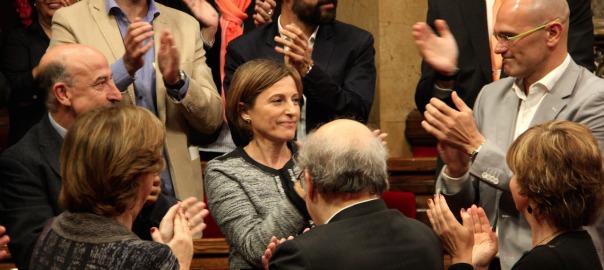26.10.2015 - 23:11
|
Actualització: 27.10.2015 - 00:11
Today was a day of historic significance for Catalonia. This is the first time in its history that Catalonia elects a parliament than enjoys a pro-independence majority both in number of seats and in its leadership. The speaker of the new parliament will be Carme Forcadell, the former president of the civil society group Catalan National Assembly, who only three years ago, after a massive pro-independence rally of Catalonia’s National Day, asked members of parliament to launch a process toward secession from Spain. As of today, Forcadell will preside over the chamber during a legislative period that should mark the transition to the Catalan Republic, provided independence forces are able to work together.
Forcadell was proclaimed president of the Catalan parliament with 77 votes in favour, five more than the 72 votes that Junts pel Sí and CUP, the two secessionist political forces, were able to deliver together. The remaining five votes came from Catlunya Sí que es Pot, a party that supports a referendum but is not itself pro-independence.
Forcadell began her first speech as president by saying that she would strive to lead a parliament that represents all citizens, ‘regardless of the language they speak, where they come from, what they believe, and who they vote for.’ She also made reference to the exceptional context in which the new parliament comes into being.
However, she was very clear as to the nature of the legislative period that begins now and what its goal is: ‘The autonomic period is over and we are launching a new scenario for tomorrow. It is a foundational moment. Starting now, we are building a sovereign parliament that wants to represent a free territory. Let us build a free country of free citizens, let us be a role model’.
Junts pel Sí and CUP were able to reach an agreement to elect Forcadell, but they have not yet agreed on who should be the next president of the Catalan government. The parliamentary debate to elect a new president is scheduled for 9 November, exactly one year after the unofficial referendum on independence from Spain was held. The parties are mired in a contentious negotiation, as CUP refuses to support Mas as president, saying that the new president should provide a clean break with the previous political period and cannot be someone who has had any role in the cutbacks on social spending. For its part, Junts pel Sí does not appear willing to sacrifice president Artur Mas, a figure it deems essential to the independence process.
If the two parties are not able to reach an agreement, parliament will have a maximum of two months to elect a president. During this time, as many debates as needed will take place. The deadline to elect a president is 9-10 January, at which point, in accordance with the law, if no agreement is in place, parliament will be dissolved and elections called.

